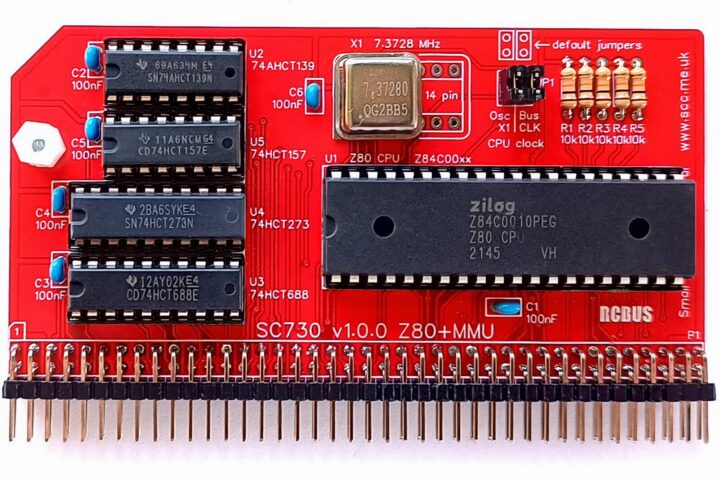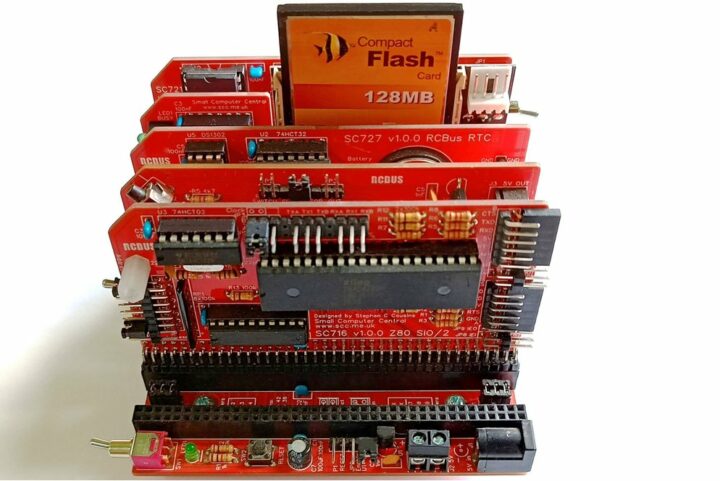Small Computer Central has released a new module kit, the SC730, for the 80pin-RCBus backplane which features the widely-used 8-bit Zilog Z80 CPU and a memory management unit.
The Zilog Z80 is an 8-bit microprocessor created to be compatible with the Intel 8080 microprocessor while offering more advanced features such as built-in DRAM refresh, a better interrupt system, and non-multiplexed buses. The Z80 microprocessor was widely used for various applications between the 70s and the 80s and is still quite popular among retro computing enthusiasts today.
Cousins’ SC730 module kit is designed to fit into an 80-pin socket on an RCBus backplane. The module is built to be used with a memory module as part of a complete computer system. The memory management unit (MMU) is compatible with a 1MB linear memory module such as the SC721. It maps a fixed 32KB bank of RAM to the top of the Z80’s 64KB memory map and one of the two 32KB banks of ROM/RAM to the bottom of the Z80’s 64KB memory map.
This memory configuration works well for running RomWBW (a ROM-based implementation of CP/M), traditional CP/M 2.2, or any other operating system that does not use more than 64KB of memory.
We recently covered the CERBERUS 2100 which features the Z80 microprocessor with a Western Design Center 6502 CPU and a Microchip AVR processor.
SC730 module specifications:
- CPU – Z80 microprocessor
- 1x 7.3728 MHz clock oscillator
- 1x Memory Management Unit (MMU)
- Suitable memory for running RomWBW and CP/M
- Compatible with RCBus-Z80 (80-pin bus)
In related news, Zilog has discontinued the Z80 CPU, and associated products. Last-time orders will be received manually till June 14, 2024. Later variations such as the Zilog eZ80 and Z180 should remain in production. More information can be found in the embedded tweet below.
The end of an era #Zilog #Z80 pic.twitter.com/vOsMDlIOID
— Óscar Toledo G. (@nanochess) April 19, 2024
The SC730 kit is priced at $34 on Tindie and is available in five color variants. If you are interested in the board, it’d be best to snatch one up before they are out of stock. You can learn more about the RCBus specification and designing your own RCBus computer in Small Computer Central’s blog post.

Tomisin is a writer specializing in hardware product reviews, comparisons, and explainers. He is very passionate about small form factor and single-board computers.
Support CNX Software! Donate via cryptocurrencies, become a Patron on Patreon, or purchase goods on Amazon or Aliexpress. We also use affiliate links in articles to earn commissions if you make a purchase after clicking on those links.







What’s nice is to see that the RC2014 bus continues to evolve in 2024 to better support 40-year old computers that continue to adopt new technologies (flash etc). It’s not just about the retro aspect that some are seeking, but the ability to understand and master 100% of what you’re doing in fact. These should really be seen as educational tools. What was pleasant with such machines is that the entire source code of any program running there could be read in a single day. From there you figure what parts you really want to focus on and study in details. Of course, some concepts have evolved a lot since then (memory protection, even protection against hardware speculation etc), but for those who want to go into robotics or microcontrollers, everything learned there is totally relevant. And it’s not a mistake if such chips are still sold 48 years after their introduction. The Z80 is about the NE555 of computers 😉
That’s insightful. Thank you.
In a world where teens are doing nand2tetris with no prior knowledge and RV32I softcores fitting comfortably on half-a-decade old $20 ICE40 boards, I’d say the z80 has passed its prime even as an educational tool.
In part yes, but not for everything. It happens that you had a huge amount of software available on Z80 that was fairly complete feature-wise despite being compact. You’ll find operating systems such as CP/M that can teach you some of the basics while being easy to study. On RV32 you’ll have alternate options, maybe some RTOS but not necessarily with such a complete set of applications, so you could be more quickly reaching the limit of what to study without having to write your own code. And looking at some limited designs is a great way to see the negative impacts of certain design patterns that must absolutely not be reproduced for example.
> amount of software… CP/M that can teach you some of the basics… you could be more quickly reaching the limit of what to study without having to write your own code
Little of it will apply to modern processors or micros better than what you’d learn if you diverge to C and learn some compiler and system topics like how ECE, CS and BSCE curriculum already teach things. Moreover, without the math to pick apart the algorithmic costs and how they apply to different architectures, you’d be effectively memorizing stuff you won’t even know when to apply. Like, what is there in a z80 that can be applied to its 8051 contemporary let alone something like an ARM or RISC-V with 32 registers to use and lots of RAM in-between? It’s stuff best left for a third year elective or something for people wanting to do arch design or something.